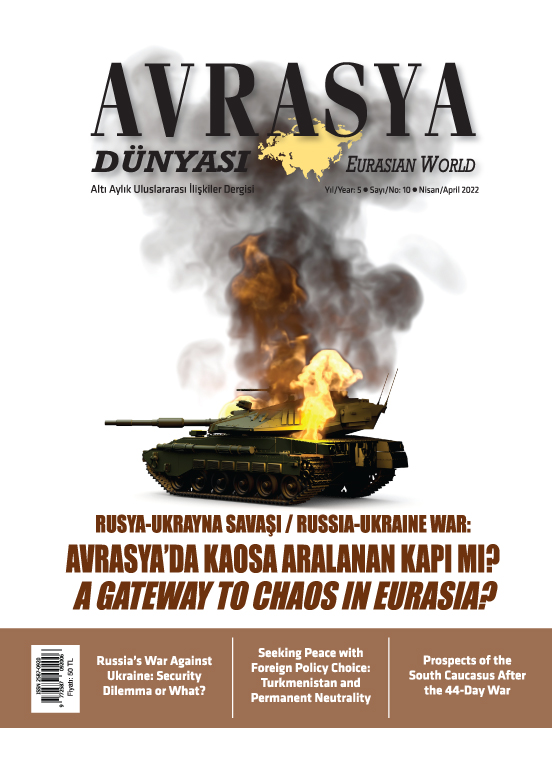We are pleased to meet you once again on the occasion of the publication of the 10th issue of the Eurasian World.
Even though issues, challenges and locations have changed; our journey, which we started together 4 years ago, continues with the same excitement and high motivation. Just as you may remember, at the beginning of this journey, we tried to analyze issues and challenges that occupied the Eurasian agenda for a certain period of time by discussing them separately and profoundly. We made efforts to contribute to our readers’ understanding who are interested in those issues. Later on, we turned our focus into the sub-regions which comprise the Eurasia as we understand it. Within this frame, we aimed to understand and introduce the Balkans, Caucasus, Central Asia and finally the western end of Eurasia, “New Eastern Europe.”
At this point, of course we could not have thought that Russia and Ukraine, the two most important countries of the “New Eastern Europe,” would engage in a war of this intensity and turn the region into a bloodbath; that we would see heartbreaking human tragedies; that it might be possible for the war to exceed Eurasian borders and become global in a way that could cause a third world war; and that finally world citizens would dread the threat of a nuclear war. Unfortunate circumstances at this scale could not even be foreseen in our reviews. However, all these came to be true. As a matter of fact, we are experiencing all those scenarios that may have seemed to many of us as "futuristic" in the recent past and we are witnessing them with a certain degree of discomfort.
Our journal could not turn a blind eye to the process which Russian Federation initiated by putting a great mass of troops along Ukraine’s border and later accelerating the pace first by recognizing the two entitites in Donetsk and Luhansk on February 21, and later invading them and finally reaching to the point of invading Ukraine as of the morning of 24 February 2022. Aside from taking place in the middle of the Europe in 21th century, Russian- Ukrainian war is also important for us in terms of being a war in Eurasia . Therefore, we decided to tackle this subject from different angles in this issue. In accordance with our traditional approach, we selected to take up Russian-Ukrainian war as our primary subject of this issue. Without a doubt, it is our sincere wish that the war reaches to a peaceful end before long so that we would not have to dwell on this issue again. Eurasian World will continue to follow the developments with this ardent hope.
With these thoughts in our minds, we hope you enjoy reading this issue of the Eurasian journal. As always, we would like to end by expressing our pleasure and gratitude for your continued interest in our journal.
"Central Asia in Between Russia, China, and the United States: Cooperation or Competition?" Nosirkhon Qodirov
"Understanding the Significance of Regional Cooperation: Case Study of Central-South Asia," Khalid Taimur Akram
"India and Pakistan, the Quest to Reach Out to Central Asia," Hossein Ebrahim Khani
"Russia’s War Against Ukraine: Security Dilemma or What?" Assoc. Prof. Ibrahim Muradov
"Rusya’nın Ukrayna’ya Askeri Müdahalesini Hukuken Dayandırdığı Gerekçeler ve Uluslararası Adalet Divanı Önündeki Dava Sürecine Dair Bir İlk Değerlendirme," Dr. Öğr. Gör. Onur Uraz
"Ukrayna Krizi Bağlamında Montrö Boğazlar Sözleşmesi," Fatih Dönmez
"Swift System Turns Into Economic Sanctions Instrument," Teoman Ertuğrul Tulun
"Prospects of the South Caucasus After the 44-Day War," Mykola Zamikula
"Seeking Peace with Foreign Policy Choice: Turkmenistan and Permanent Neutrality," Gözde Demirel
"The Evolution of National Identity in Uzbekistan: Past, Present and Future," Allayarov Sardor Frunzeyevich
"Bölgesel İşbirliğinde Öne Çıkan Bir Aktör: Türk Devletleri Teşkilatı," Gülperi Güngör
"Energy, the Balkans and the Game of Great Powers," Abbas Rasouli
Nosirkhon Qodirov (Ph.D. Student, Doctoral School of Law and Political Science, University of Szeged, Szeged, Hungary)
Khalid Taimur Akram (Executive Director, Center for Global & Strategic Studies (CGSS), Islamabad, Pakistan)
Hossein Ebrahim Khani (Former Ambassador, Research Fellow, Institute for Political and International Studies (IPIS), Tehran, Iran)
Assoc. Prof. Ibrahim Muradov (Department of International Relations and Audit, Dnipro University of Technology, Dnipro, Ukraine)
Assist. Prof. Onur Uraz (International Law – Public Law Department, Hacettepe University, Ankara, Turkey)
Fatih Dönmez (Research Assitant, International Law – Public Law Department, Hacettepe University, Ankara, Turkey)
Teoman Ertuğrul Tulun (Analyst, Center for Eurasian Studies (AVİM))
Mykola Zamikula (Senior Research Fellow, National Institute for Strategic Studies, Kyiv, Ukraine)
Gözde Demirel (Consultant on Central Asian Region, Turkish State Railways (TCDD); Ph.D. Candidate, Area Studies Program, Middle East Technical University, Ankara, Turkey)
Allayarov Sardor Frunzeyevich (Graduate Student, Faculty of Political Sciences and Law, University of Szeged, Szeged, Hungary)
Gülperi Güngör (Analyst, Center for Eurasian Studies (AVİM))
Abbas Rasouli (Counselor of the Embassy, Ministry of Foreign Affairs of the Islamic Republic of Iran)


